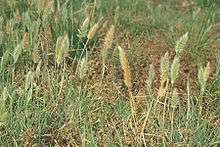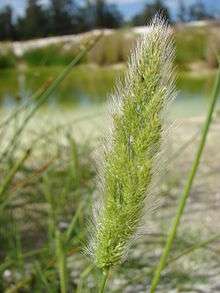Polypogon
Polypogon is a nearly cosmopolitan genus of plants in the grass family, commonly known beard grass or rabbitsfoot grass.[2][3][4]
| Polypogon | |
|---|---|
 | |
| Polypogon interruptus | |
| Scientific classification | |
| Kingdom: | Plantae |
| Clade: | Tracheophytes |
| Clade: | Angiosperms |
| Clade: | Monocots |
| Clade: | Commelinids |
| Order: | Poales |
| Family: | Poaceae |
| Subfamily: | Pooideae |
| Supertribe: | Poodae |
| Tribe: | Poeae |
| Subtribe: | Agrostidinae |
| Genus: | Polypogon Desf. |
| Type species | |
| Polypogon monspeliensis | |
| Synonyms[1] | |
| |

Description
Polypogon species vary in appearance; some are erect, while others drape over the ground in waves. Many have soft, fluffy inflorescences that look like rabbit's foot amulets.
Some are introduced species established outside their native ranges.[5] Some of those are considered invasive species and noxious weeds, most notably Polypogon monspeliensis, the annual beard grass.
- Polypogon × adscendens Guss. - Italy
- Polypogon australis Brongn. - Argentina, Chile incl Juan Fernández Islands
- Polypogon chilensis (Kunth) Pilg. - Argentina, Chile incl Juan Fernández Islands, Paraguay, Uruguay, Peru, Brazil
- Polypogon elongatus Kunth - USA (CA AZ CO TX), much of Mesoamerica + South America
- Polypogon exasperatus (Trin.) Renvoize - Argentina, Chile, Paraguay, Uruguay, Peru, Ecuador, Bolivia, Colombia, southern Brazil
- Polypogon fugax Nees ex Steud. - China, Japan, Korea, central + southwestern Asia, Ethiopia, Somalia
- Polypogon griquensis (Stapf) Gibbs Russ. & Fish - Namibia, South Africa
- Polypogon hissaricus (Roshev.) Bor - Xinjiang, Central Asia, Pakistan, Iran, Himalayas
- Polypogon imberbis (Phil.) Johow - Argentina, Chile incl Juan Fernández Islands, Uruguay, southern Brazil
- Polypogon interruptus Kunth - British Columbia, western United States (WA to CA + TX), Mexico, south America
- Polypogon ivanovae Tzvelev - Xinjiang
- Polypogon linearis Trin. - Chile
- Polypogon maritimus Willd. - wetlands in Asia, Mediterranean
- Polypogon mollis (Thouars) C.E.Hubb. & E.W.Groves - Tristan da Cunha
- Polypogon monspeliensis (L.) Desf. - Africa, Eurasia; widely naturalized in North America
- Polypogon nilgiricus Kabeer & V.J.Nair - India
- Polypogon parvulus Roseng., B.R.Arrill. & Izag. - Uruguay, Argentina
- Polypogon pygmeus Tzvelev - Afghanistan
- Polypogon schimperianus (Hochst. ex Steud.) Cope - from Ethiopia + Saudi Arabia to Zimbabwe
- Polypogon tenellus R.Br. - South Australia, Western Australia
- Polypogon tenuis Brongn. - Ascension Island, St. Helena, Namibia, Cape Province
- Polypogon viridis (Gouan) Breistr. - central + southwestern Asia, Mediterranean
- Formerly included[1]
Numerous species now regarded as better suited to other genera: Agrostis Alopecurus Brachypodium Chaetium Chaetopogon Gymnopogon Muhlenbergia Pentameris Reynaudia Triniochloa
Phytoremediation
Polypogon monspeliensis[13] was investigated for its mercury-accumulating properties as a phytoremediation plant. A U.S. NIS—National Institutes of Health funded study showed the plant to take up 110 times more mercury (HgS) than control plant species. This mercury hyperaccumulator sequesters the toxin in its roots in an insoluble form, reducing exposure to ecological receptors in situ and in erosion sediments.[14]
References
- Kew World Checklist of Selected Plant Families
- Desfontaines, René Louiche. 1800. Flora Atlantica 1: 66-67 in Latin
- Tropicos, Polypogon Desf.
- Flora of China Vol. 22 Page 361 棒头草属 bang tou cao shu Polypogon Desfontaines, Fl. Atlant. 1: 66. 1798.
- USDA . accessed 04.12.2012
- The Plant List search for Polypogon
- Altervista Flora Italiana, genere Polypogon Archived 2015-03-23 at the Wayback Machine
- Finot Saldías, V. L., L. Contreras, W. Ulloa, A. E. Marticorena, C. M. Baeza & E. Ruiz. 2013. El género Polypogon (Poaceae: Agrostidinae) en Chile. Journal of the Botanical Research Institute of Texas 7(1): 169–194
- Cabi, E. & M. Doğan. 2012. Poaceae. 690–756. In A. Güner, S. Aslan, T. Ekim, M. Vural & M. T. Babaç (eds.) Türkiye Bitkileri Listesi. Nezahat Gökyiğit Botanik Bahçesi ve Flora Araştırmaları Derneği Yayını, Istanbul
- Idárraga-Piedrahita, A., R. D. C. Ortiz, R. Callejas Posada & M. Merello. (eds.) 2011. Flora de Antioquia: Catálogo de las Plantas Vasculares 2: 9–939. Universidad de Antioquia, Medellín
- Atlas of Living Australia, Polypogon Desf. Beard Grasses
- Biota of North America Program 2013 county distribution maps
- Plodinec, J. (2003). Instrumentation Development, Measurement and Performance Evaluation of Environmental Technologies. Quarterly Technical Progress Report No. 40395R20. Diagnostic Instrumentation and Analysis Laboratory. Mississippi State University. Starkville, MS.
- Expert Panel Report; Boeing SSFL site; pg. 20 . accessed 04.12.2012
| Wikimedia Commons has media related to Polypogon. |
External links
- Jepson Manual Treatment — Polypogon
- USDA Plants Profile: Polypogon (rabbitsfoot grass)
- Polypogon. Grass Manual on the Web.